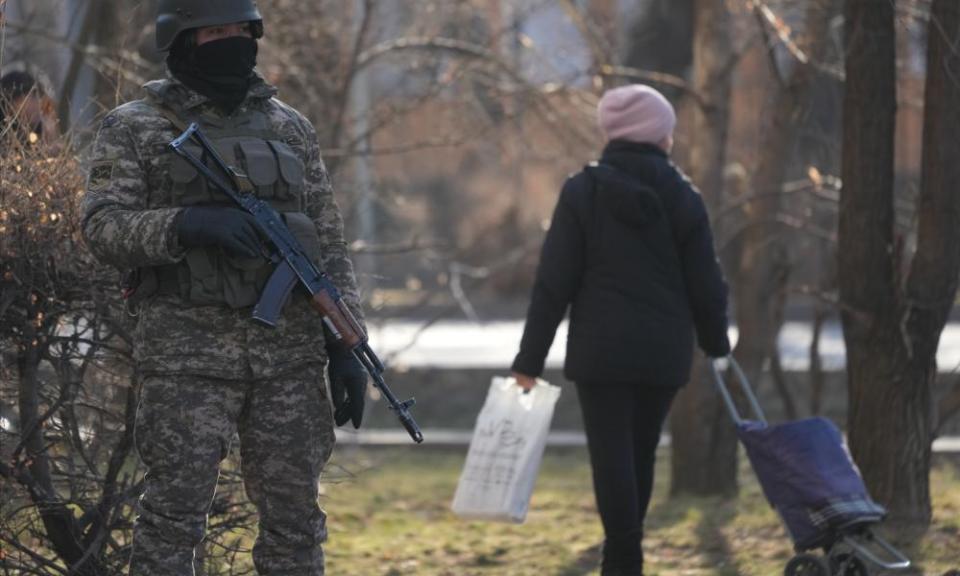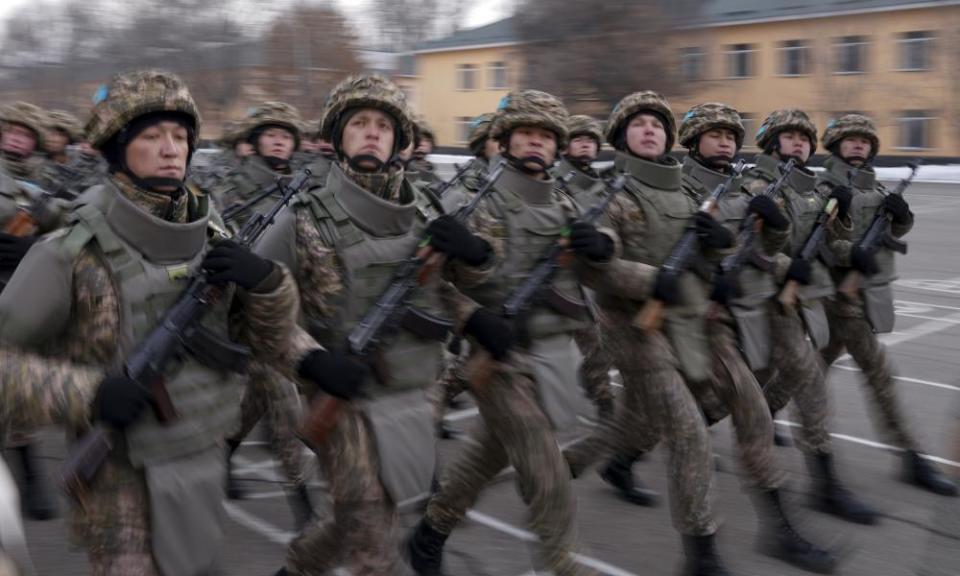Scepticism in uneasy Kazakhstan as president promises reform

Kazakhstan’s president, Kassym-Jomart Tokayev, who at the height of unrest last week said he had ordered troops to shoot to kill without warning, has spent this week taking a softer line and promising genuine reform.
However, with thousands of people still in detention and a behind-the-scenes power struggle still not fully resolved, many have expressed scepticism.
“People who have carried out serious crimes will be punished in accordance with the law,” Tokayev wrote on Twitter on Friday. “For others, I order the prosecutor to determine their level of guilt, and if there are no aggravating circumstances, to soften their punishment.”
More than 10,000 people have been detained during the past two weeks. At the height of the protests, Tokayev said “20,000 terrorists” had attacked Kazakhstan’s largest city, Almaty, but these numbers seem to have been quietly revised.
On Thursday, the prosecutor’s office said 494 criminal cases had been opened, including 44 for terrorism. Most of those detained instead faced administrative charges with a maximum of 15 days in jail.
Journalists and rights activists say there is little transparency about the criminal charges and still no reliable figure for the number of people who died in the violence. An earlier figure of 164, published by a government-linked source, was later retracted.

Even in the west of the country, where the protests began over a sharp increase in fuel prices, and where events remained largely peaceful, police rounded up hundreds of people involved in the demonstrations.
Max Bokay, a longstanding rights activist in the western city of Atyrau, said by telephone that about 500 people had been detained in the region, often by police who came to their homes after Tokayev implemented a state of emergency last week. He only knew of one case where criminal charges had been launched, but said people detained on administrative charges had spoken of intimidation and beatings.
Bokay, who was arrested at a 2016 protest and spent five years in jail before being released last year, said this time he had not been detained, although he had been “roughed up” by a group of men on the street during the days of protest. “And just today, a few hours ago, there were people kicking my apartment door, probably because today I had a one-person protest against torture in jails, I guess it’s an intimidation tactic,” he said on Friday.
The protests, over economic and political demands, were apparently hijacked by an intra-elite battle between Tokayev and figures close to Nursultan Nazarbayev, the country’s president from its founding in 1991 until 2019, when he handpicked Tokayev as his successor.
Karim Masimov, head of the KNB security services and a former prime minister under Nazarbayev, has been arrested on treason charges and accused of trying to seize power, along with two of his deputies. He has not been seen or heard from since the protests began.
Yermukhamet Yertysbayev, a former minister and Nazarbayev adviser, blamed “reactionary and conservative forces from the Nazarbayev clan” for stoking the unrest. “I think negotiations are ongoing, and there is a search for a compromise,” he said.
At the height of the protests, when Tokayev’s grip on Kazakhstan appeared shaky, he called on a Russia-led military alliance, the Collective Security Treaty Organisation, to intervene. More than 2,000 mostly Russian troops arrived, which helped shore up Tokayev’s position, and have already begun their departure.
Observers say the mission, while brief, has put Tokayev in Vladimir Putin’s debt and placed Kazakhstan more firmly in Moscow’s orbit. Putin has described the unrest as a “coloured revolution” backed by nefarious forces in the west, leading many people to fear a crackdown on what remains of Kazakh civil society.
Echoing Putin, Tokayev accused the independent media of helping fan the protests.
“We were very disappointed to hear those words,” said Vyacheslav Abramov, the editor-in-chief of the news portal Vlast.kz. “It’s very clear that it’s not media, it’s not civil society, who are responsible for the crisis – it’s the people in power.”
So far, Tokayev has not acted against media outlets, and has announced a series of measures aimed at winning popular support, including setting up a new fund for public good to which oligarchs and wealthy businessman will be forced to contribute.
Abramov said there were now three possible scenarios: “The first is that we have a massive crackdown, like in Belarus; the second is that we go back to where we were before the crisis; and the third one we are going towards real reforms.” The third option seemed the least likely, he added.

